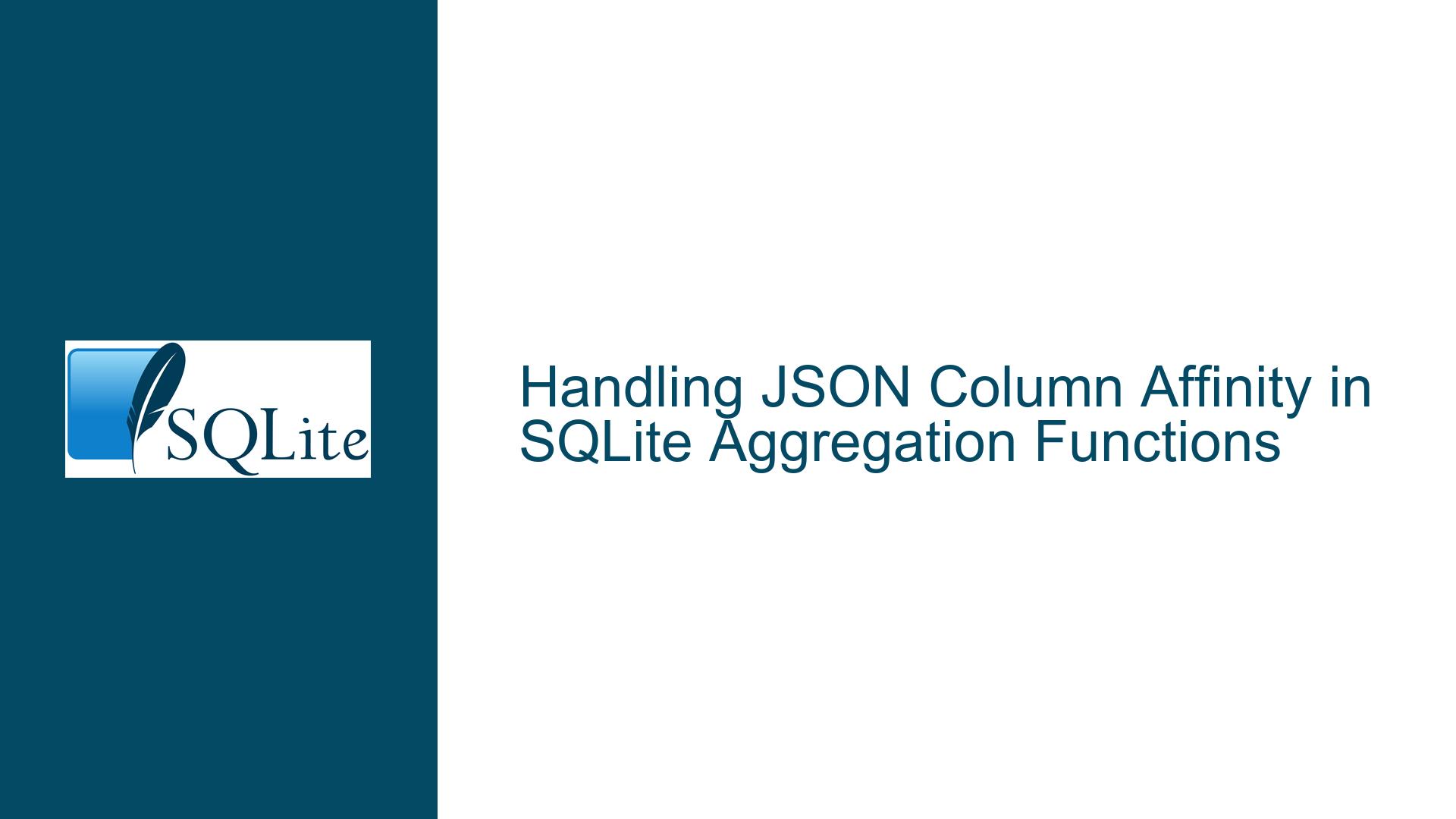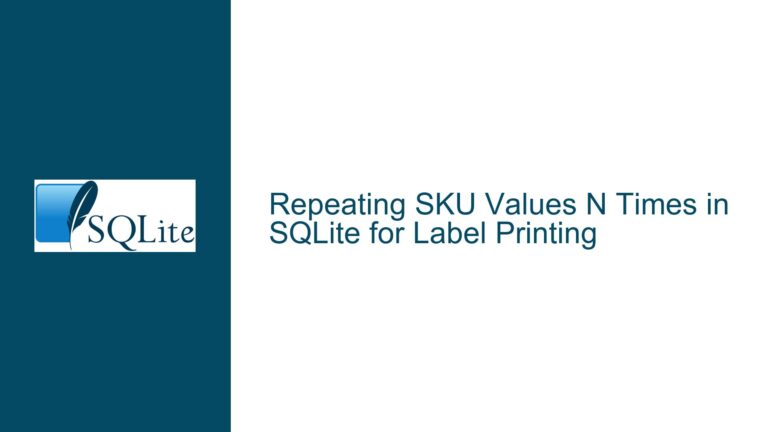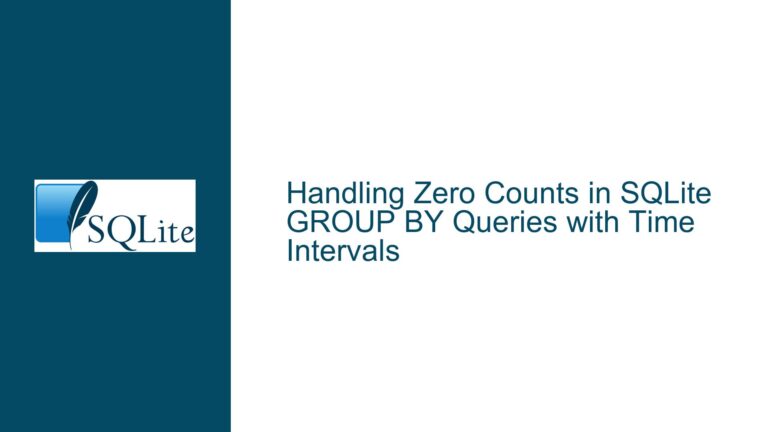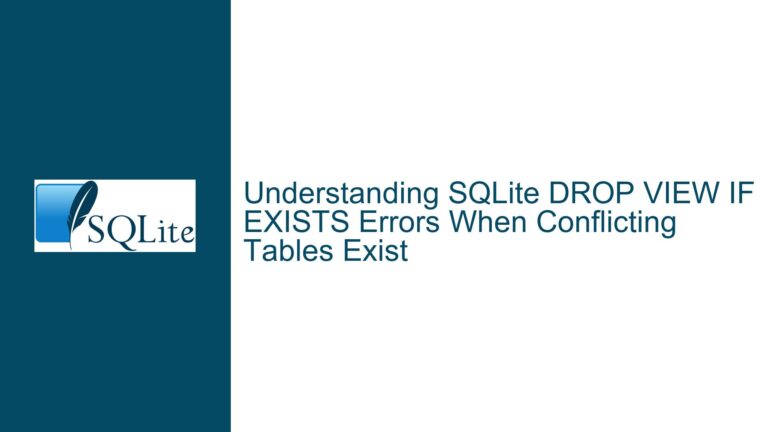Handling JSON Column Affinity in SQLite Aggregation Functions
Understanding JSON Serialization Behavior in SQLite Aggregation Functions
Issue Overview
When using SQLite’s JSON functions (e.g., json_group_array or json_object) to aggregate JSON data from subqueries, developers may encounter unexpected serialization behavior. For example, consider the query:
select json_group_array(o) from (select json_object('hello', 123) o);
This returns a JSON array containing a stringified JSON object:
["{\"hello\":123}"]
To obtain a properly nested JSON array (e.g., [{"hello":123}]), an explicit json() call is required:
select json_group_array(json(o)) from (select json_object('hello', 123) o);
This forces SQLite to parse the JSON string and re-serialize it, adding computational overhead. The root cause lies in how SQLite handles column affinity for JSON values and the lack of native JSON type recognition in aggregation workflows.
Key Observations
- JSON as TEXT Affinity: SQLite treats JSON values as TEXT with a JSON subtype. However, this subtype is not preserved across all operations (e.g., subquery results or storage).
- Subtype Propagation: The JSON subtype is retained only through direct function calls (e.g.,
json()). When values pass through subqueries or are stored in tables, the subtype is lost, and the value is treated as plain TEXT. - Performance Impact: Explicitly re-parsing JSON strings with
json()introduces redundant processing, which becomes significant in large datasets.
This behavior is consistent in SQLite 3.39.x but was inconsistently observed in earlier versions (e.g., 3.38.x) due to query optimizations that occasionally preserved the subtype.
Why SQLite Lacks Native JSON Affinity Support
Possible Causes
1. SQLite’s Closed Type System
SQLite’s type system is intentionally minimalistic, with five storage classes: NULL, INTEGER, REAL, TEXT, and BLOB. Column affinity (TEXT, NUMERIC, etc.) guides value storage and conversion but does not introduce new types. JSON values are stored as TEXT with a subtype, but this subtype is ephemeral and not part of the core type system.
2. Subtype Limitations
The JSON subtype is a metadata flag attached to values, not a first-class type. Subtypes are preserved only during direct function chaining (e.g., json(json_object(...))). When values traverse subqueries, temporary tables, or storage, the subtype is discarded, reverting to plain TEXT.
3. Aggregation Function Behavior
Functions like json_group_array operate on input values without awareness of their original subtypes. If the input is TEXT (even if it was originally JSON), the function treats it as a string, leading to double-serialization.
4. Historical Context
The JSON1 extension was initially an add-on, and its integration into the core (since SQLite 3.38.0) did not extend the type system. Backward compatibility constraints prevent introducing JSON as a native affinity, as it would break existing schemas and queries.
5. Declared Type vs. Storage
Column declared types (e.g., JSON) influence affinity but do not enforce storage rules. For example, a column declared as JSON still has TEXT affinity. Subqueries and derived tables discard declared types, further complicating subtype propagation.
Strategies for Efficient JSON Handling in SQLite
Troubleshooting Steps, Solutions & Fixes
1. Explicit JSON Parsing in Aggregation
While inefficient, wrapping JSON values with json() ensures proper serialization:
select json_group_array(json(o)) from (select json_object('hello', 123) o);
Trade-offs:
- Correctness: Guarantees valid JSON output.
- Performance: Adds parsing overhead proportional to dataset size.
2. Avoiding Subqueries for JSON Propagation
Flatten queries to avoid subqueries where possible. For example:
select json_group_array(json_object('hello', 123)) from some_table;
This bypasses intermediate TEXT conversion, preserving the JSON subtype through direct function nesting.
3. Leveraging SQLite’s Subtype Propagation Rules
Chain JSON functions to retain subtypes:
select json_group_array(o) from (select json(json_object('hello', 123)) o);
Here, the inner json() call ensures the subtype survives into the subquery.
4. Using group_concat for Manual JSON Arrays
For simple arrays, group_concat can emulate json_group_array without double-serialization:
select '[' || group_concat(o, ',') || ']'
from (select json_object('hello', 123) o);
Caveats:
- Requires manual handling of JSON syntax (e.g., commas, quotes).
- Less robust for nested structures.
5. Schema Design with JSON Constraints
Add CHECK constraints to enforce JSON validity at insertion:
create table data (
id integer primary key,
content text check (json_valid(content))
);
This ensures stored JSON is valid but does not address subtype propagation.
6. Feature Requests and Community Advocacy
Advocate for enhanced JSON handling by:
- Proposing subtype preservation in subqueries via SQLite’s GitHub issue tracker.
- Contributing patches that extend the query planner to recognize JSON subtypes in aggregation contexts.
7. Monitoring SQLite Version Updates
Newer SQLite versions may optimize JSON handling. For example, SQLite 3.42.0 introduced performance improvements for JSON functions.
8. Alternative Databases with Native JSON Support
For applications requiring robust JSON operations, consider databases like PostgreSQL (JSONB) or MySQL (JSON type), which offer native JSON storage and indexing.
9. Application-Layer JSON Processing
Offload JSON parsing to the application layer. Retrieve raw TEXT values and deserialize them in code, avoiding redundant SQLite parsing.
10. Custom SQLite Extensions
Develop a custom extension to handle JSON affinity, though this requires deep C expertise and forking SQLite’s codebase.
Final Recommendations
- Use explicit
json()wrappers for correctness in aggregation. - Minimize subqueries in JSON-heavy workflows.
- Monitor SQLite releases for JSON-related optimizations.
- Consider hybrid approaches (application-layer parsing) for performance-critical tasks.
While SQLite’s type system constraints make native JSON affinity unlikely in the near term, understanding its subtype mechanics and query planner behavior enables effective workarounds.






